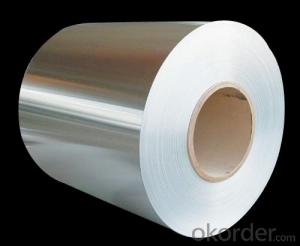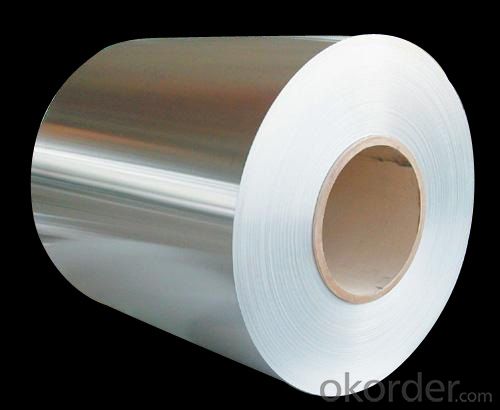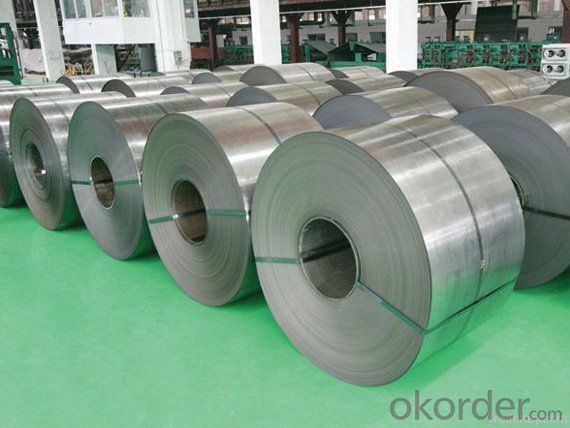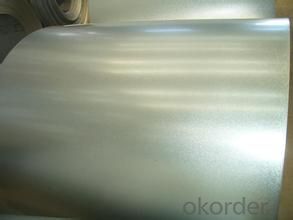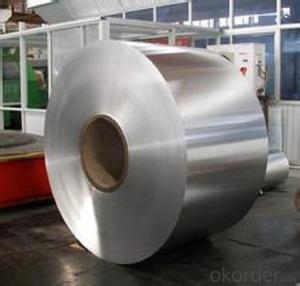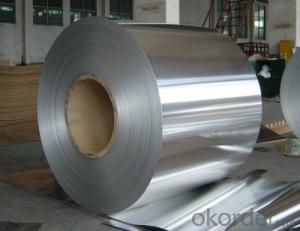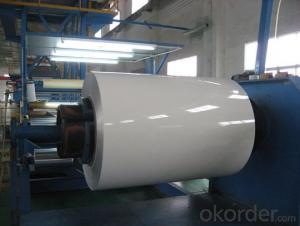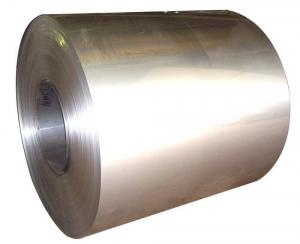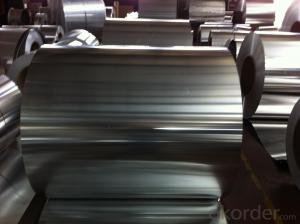American Standard Aluminum Coils for Roofing, Ceiling, Gutter, Decoration
- Loading Port:
- Tianjin
- Payment Terms:
- TT OR LC
- Min Order Qty:
- 100 m.t
- Supply Capability:
- 10000 m.t/month
OKorder Service Pledge
OKorder Financial Service
You Might Also Like
Specification
Product introduction:
Product | plain aluminum coil prices |
Thickness | 0.1mm-10mm |
Width | 300mm-3000mm |
inner diameter | 505mm or 105mm (as per requirements) |
weight | 15000kg-3000kg |
Material | 1050,1060,1100,3003,3004,3105,5052,5005, 5754,5083, 6061,6063 etc |
Temper | O,H12,H14,H16,H18,H24,H26,H32,H34,H111,H112,T3, T5,T6 etc |
Surface | flat |
Packing | Export standard wooden pallets (as per requirements) |
Payment Terms | 30% T/T +70% balance against the B/L copy or 100% L/C at sight |
MOQ | 5 tons per size |
Delivery time | 20-30 days after receiving L/C or deposit |
Loading Port | QINGDAO China (Any port in CHINA) |
Remark | Alloy grade,temper or specification can be discussed at your request |
Product chemical composition :
Grade | Si | Fe | Cu | Mn | Mg | Cr | Ni | Zn | Al |
1050 | 0.250 | 0.400 | 0.050 | 0.050 | 0.050 | - | - | 0.050 | 99.50 |
1060 | 0.250 | 0.350 | 0.050 | 0.030 | 0.030 | - | - | 0.050 | 99.60 |
1070 | 0.200 | 0.250 | 0.040 | 0.030 | 0.030 | - | - | 0.040 | 99.70 |
1100 | Si+Fe:0.95 | 0.05-0.2 | 0.050 | - | - | 0.100 | - | 99.00 | |
3003 | 0.600 | 0.700 | 0.05-0.2 | 1.0-1.5 | - | - | - | 0.100 | remains |
5005 | 0.300 | 0.700 | 0.200 | 0.200 | 0.50-1.1 | 0.100 | - | 0.250 | remains |
5052 | 0.250 | 0.400 | 0.100 | 0.100 | 2.2-2.8 | 0.15-0.35 | - | 0.100 | remains |
5083 | 0.400 | 0.400 | 0.100 | 0.40-1.0 | 4.0-4.9 | 0.05-0.25 | - | 0.250 | remains |
5754 | 0.400 | 0.400 | 0.100 | 0.500 | 2.6-3.6 | 0.300 | - | 0.200 | remains |
8011 | 0.50-0.9 | 0.6-1.0 | 0.100 | 0.200 | 0.050 | 0.050 | - | 0.100 | remains |
Product application:
Building,roof material,electric,packaging,machine,aluminum plastic composite pipe,cable etc.
Our services
Main Services:
> Precision aluminum plate
> Casting products
> Forging products
Special Services:
> Alloy selection
> Aluminum machining techniques
> Hot working
> Surface treatment
Our Promise
---High quality stainless steel with reasonable price.
---Wide excellent experiences with after-sale service.
---Every process will be checked by responsible QC.
---Professional packing teams which keep every packing safely.
---Trial order can be done in one week.
---Samples can be provided as your requirements.
FAQ
Q: Do you have the CE, TUV, UL Certification?
A: We’ve already passed all the tests, and any certificate is available.
Q: Have you ever sold your products to companies in my country?
A: Of course, we have customers in all general PV markets, but I think we should expand our market share along with the market growth.
Q: How do you pack your products?
A: We have rich experience on how to pack to make sure the safety on shipment when it arrives at the destination.
Q: Can you do OEM for us?
A: Yes, we can.
Q: Can we visit your factory?
A: Surely, I will arrange the trip basing on your business schedule.
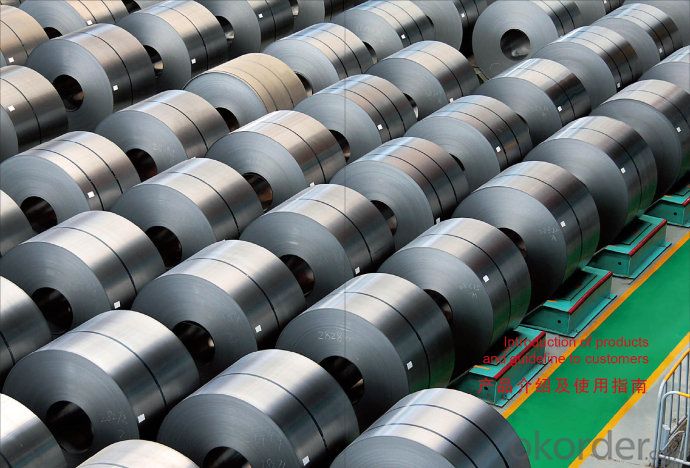
- Q: What precautions should be taken while using tools for handling aluminum coils?
- <p>When handling aluminum coil tools, it's crucial to follow safety measures to prevent accidents. Always wear appropriate personal protective equipment (PPE) such as gloves, safety glasses, and closed-toe shoes. Ensure the tools are in good condition and well-maintained. Keep the work area clean and free of debris to avoid slips or trips. Be cautious of sharp edges on the aluminum coils, as they can cause cuts. Use lifting equipment when necessary and never attempt to lift heavy coils manually. Follow all manufacturer guidelines for the safe operation of the tools. Regularly inspect the tools for any signs of wear or damage and replace them as needed.</p>
- Q: How much is a ton gate of Jiangxi aluminium roll?
- Hello, roll gate is usually calculated according to the square count. Is there your Lian Xi?Want to know the size of your installation? The following guidelines and measurement for your reference, you can go out according to the guidelines for measuring hole length and width, a specific size can determine the lattice dielectric.
- Q: Are aluminum coils suitable for electrical conductivity?
- Yes, aluminum coils are suitable for electrical conductivity. Aluminum is a highly conductive material that has a conductivity rating of approximately 62% of the International Annealed Copper Standard (IACS). This makes aluminum coils an excellent choice for various electrical applications, including power transmission and distribution, electrical motors, and transformers. Additionally, aluminum coils offer advantages such as lightweight, high corrosion resistance, and lower cost compared to copper coils. However, it is important to note that aluminum has a lower conductivity than copper, so larger aluminum coils may be required to achieve the same level of conductivity as smaller copper coils. Overall, aluminum coils are a viable and commonly used option for electrical conductivity.
- Q: What is the maximum length of aluminum coils?
- The maximum length of aluminum coils can vary depending on factors such as the type and thickness of the aluminum, the manufacturing process, and transportation limitations. Typically, aluminum coils can range from a few hundred feet to several thousand feet in length.
- Q: Can aluminum coils be recycled?
- Yes, aluminum coils can be recycled. Aluminum is one of the most commonly recycled materials due to its high recyclability. The recycling process for aluminum coils involves melting them down to remove any impurities and then reshaping them into new products or coils. Recycling aluminum coils not only helps conserve natural resources but also reduces energy consumption and greenhouse gas emissions compared to producing new aluminum from raw materials.
- Q: Are aluminum coils available in custom sizes?
- Yes, aluminum coils are available in custom sizes.
- Q: What is the typical elongation of aluminum coils?
- The typical elongation of aluminum coils can vary depending on the specific alloy and manufacturing process, but it generally ranges from 5% to 30%.
- Q: Can aluminum coils be painted or coated for aesthetic purposes?
- Yes, aluminum coils can be painted or coated for aesthetic purposes. Aluminum is a versatile material that can be easily painted or coated to enhance its appearance. Painting or coating aluminum coils can provide a wide range of color options and finishes, allowing for customization and aesthetic appeal in various applications. The paint or coating can also provide additional protection against corrosion and weathering, increasing the durability and longevity of the aluminum coils. However, it is important to select the appropriate type of paint or coating that is compatible with aluminum and suitable for the intended use to ensure optimal results.
- Q: This question is asking for methods or strategies to protect aluminum coils from rusting.
- <p>To prevent aluminum coil from rusting, it's important to understand that aluminum doesn't rust like iron does; it forms a protective oxide layer that prevents further corrosion. However, to maintain the integrity of the aluminum coil and prevent other forms of degradation, you can: 1. Store the coils in a dry environment to avoid moisture-induced corrosion. 2. Apply a protective coating or lacquer to the surface. 3. Use anti-corrosion packaging materials during transportation and storage. 4. Regularly inspect the coils for any signs of damage or corrosion and address them promptly. 5. Avoid contact with aggressive chemicals that can break down the protective oxide layer. Proper handling and storage are key to maintaining the quality of aluminum coils.</p>
- Q: hey, my dad and i are working on painting our front door and the current piece of aluminum in front of it wont go with the new color. it doesnt look like it can be changed out so we are wondering, other than spray paint, what can you put on aluminum to make it turn permanently black. my dad mentioned gun blue, but that only works on steel. thanks
- Dad is on the right track....maybe. There are blackeners for aluminum you can get from gunshops. Used to touch up scratched or worn black anodized finish on aluminum gun parts. Never used it in large areas. Best regards
Send your message to us
American Standard Aluminum Coils for Roofing, Ceiling, Gutter, Decoration
- Loading Port:
- Tianjin
- Payment Terms:
- TT OR LC
- Min Order Qty:
- 100 m.t
- Supply Capability:
- 10000 m.t/month
OKorder Service Pledge
OKorder Financial Service
Similar products
Hot products
Hot Searches
Related keywords
